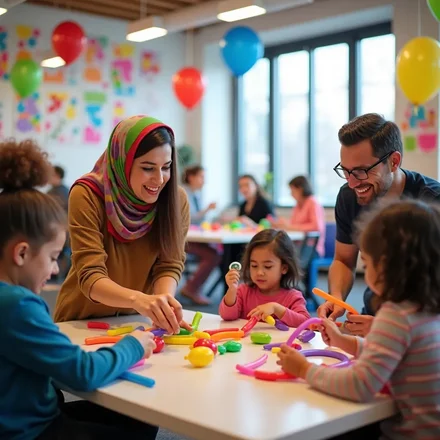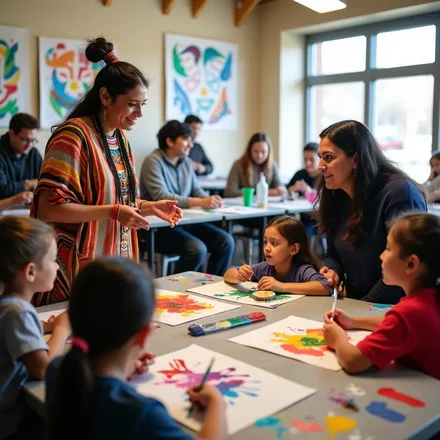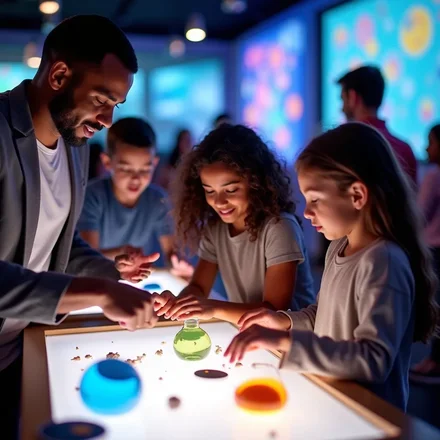Unleash Your Family's Creativity
Explore. Create. Connect.
Discover endless creative family activities that blend cultural exploration with leisure time, tailored for every Canadian family.

Discover endless creative family activities that blend cultural exploration with leisure time, tailored for every Canadian family.

At readerboot, we bring families together through innovative cultural and leisure experiences. With over 10 years of expertise, we offer activities designed to enhance family bonding and create lasting memories. Our platform connects you with diverse experiences tailored to your interests across Canada. Join us in exploring the rich tapestry of cultural activities available for families.
Discover local traditions and heritage through engaging activities that enrich family bonds and cultural understanding.
Experience a variety of fun-filled, outdoor adventures that promote physical activity and family togetherness in Canada’s stunning landscapes.
Unleash your family’s creativity with hands-on workshops, fostering artistic skills and memorable shared experiences.
Celebrate Canada’s diverse seasons with themed events that bring families together for fun, learning, and community spirit.
Discover a wide range of engaging activities designed for families to explore, learn, and connect. Our offerings cater to various interests, ensuring memorable experiences for everyone involved.

Our art and craft workshops provide hands-on experiences that inspire creativity in families. Participants will explore various mediums, including painting and sculpture. Each session is guided by experienced instructors to nurture artistic skills. Join us to unleash your family's artistic potential!

Join our interactive family craft workshops where creativity flows freely. These sessions encourage collaboration and allow families to create memorable projects together. Our experienced facilitators guide participants through each step, ensuring everyone can express their artistic side.

Experience the great outdoors with our family adventure outings. From hiking to nature scavenger hunts, these activities promote teamwork and exploration. Families will bond while discovering the beauty of nature in a fun and engaging way.

Our Cultural Discovery Experiences immerse families in diverse cultural traditions. Activities include music, dance, and culinary workshops led by local experts. Families will learn about different cultures through engaging and interactive sessions. Join us to celebrate diversity and build understanding.

Our outdoor adventure programs offer families a chance to explore nature through guided hiking, canoeing, and wildlife workshops. These experiences promote physical activity and environmental awareness. Families will bond while learning about local ecosystems and conservation. Get outdoors and make lasting memories together!

We offer educational programs that align with school curricula, providing families with opportunities to learn together outside the classroom. Our sessions cover various subjects and are designed to be interactive and engaging for all ages.
readerboot is dedicated to providing memorable experiences for families through cultural and leisure activities. We prioritize quality and engagement, ensuring that each activity is designed with family bonding in mind. Our diverse offerings cater to various interests and age groups, making it easy for families to connect and learn together. Join us in exploring the vibrant cultural landscape of Canada!
Our activities are designed to foster creativity and learning in a fun environment. From arts and crafts to interactive educational sessions, there's something for every family member. We emphasize hands-on engagement, ensuring that families leave with new skills and cherished memories.
We offer a wide range of activities, from outdoor adventures to cultural workshops. Each experience is crafted to encourage interaction among family members while exploring new interests. Our seasonal offerings ensure fresh and exciting options throughout the year.
Engage in interactive workshops that foster creativity and collaboration, making learning a fun and memorable experience for all ages.
Our commitment to quality is evident in every aspect of our activities. We collaborate with local experts and creative professionals to design experiences that are enriching and enjoyable. Families can trust that they are participating in well-organized and safe activities tailored for them.
Explore our flexible pricing plans designed to suit families of all sizes. Each plan offers various features to ensure a fulfilling experience for everyone.
Engage in a creative workshop perfect for families seeking artistic expression. This package includes all materials, expert instruction, and a take-home project.
Enjoy a full day of family-friendly activities designed to promote engagement and fun at an affordable rate. This package includes multiple activities, ensuring a memorable experience for all.
A curated selection of cultural activities that highlight local heritage and artistry, perfect for families looking to broaden their horizons together.
Discover the passionate team behind readerboot, where creativity meets family fun. Our diverse group of cultural enthusiasts and leisure experts are dedicated to crafting unforgettable experiences for families across Canada.

Creative Director

Family Engagement Specialist

Community Outreach Coordinator

Cultural Program Manager

Experience Designer
Join our community of families who have transformed their leisure time into unforgettable adventures. Read their stories and get inspired!
We had the best family outing ever, thanks to readerboot's recommendations!
The activities we found on readerboot transformed our weekends! Our kids loved every moment.
Our family had an incredible time at the cultural arts festival organized by readerboot. The activities were well-structured, and our kids were fully engaged throughout the day. We appreciated the friendly staff and the overall atmosphere. We are looking forward to joining more activities in the future!
readerboot made it easy for us to discover local cultural gems, and we had a blast!
A fantastic platform that connects families to unique experiences—highly recommend!
Explore our FAQ section to find detailed answers to common inquiries about our services, policies, and activities.
We offer a diverse range of activities including art workshops, cultural festivals, outdoor adventures, and educational programs, catering to families with children of all ages. Our goal is to create engaging experiences that promote creativity, learning, and connection.
To book an activity, simply visit our website and browse through our listed experiences. Once you've selected an activity, you can choose a date and time, and complete the booking process through our secure payment system. If you have any questions or need assistance, our customer service team is available to help.
Yes, our activities are designed to cater to various age groups, ensuring that both children and adults can enjoy them together. We clearly indicate age suitability for each activity on our website, making it easy for families to choose experiences that everyone can participate in.
We offer a full refund for cancellations made at least 72 hours before the scheduled activity. Cancellations made within 72 hours may be eligible for a partial refund depending on circumstances.
Yes, we provide group discounts for families with five or more members and for organizations booking multiple activities. Please contact our team for custom pricing based on your group's needs.
We prioritize safety by conducting risk assessments for all activities and ensuring that our facilitators are trained in safety protocols. We also provide safety equipment as needed and maintain a high staff-to-participant ratio.
Our cancellation policy allows for refunds if cancellations are made at least 48 hours in advance of the scheduled activity. Cancellations within 48 hours may incur a fee or may not be eligible for a refund, depending on the specific terms of the activity. Please refer to our website for full details on cancellation terms.
We encourage all participants to provide feedback through our website after completing an activity. You can rate your experience and leave comments, which help us improve our offerings. We value your opinions and take them seriously to enhance future experiences.
Most of our activities range from 1 to 3 hours, depending on the type and complexity. Specific duration details are provided in the activity descriptions on our website.
We value your feedback! After your experience, you’ll receive a follow-up email with a link to our feedback form. We encourage you to share your thoughts to help us improve.
We're here to help you make the most of your family adventures. Reach out to us with any questions or feedback, and let's create lasting memories together!
+1 (514) 589-1689
info@readerboot.com
Business Center Name: Dominion Square Business Centre Street Address: 1010 Saint Catherine Street West Building Number: Suite 1800 Floor 10, Office 15 City: Montreal Postal Code: H3B 5L1 Canada